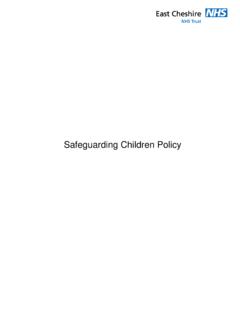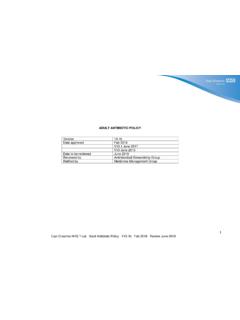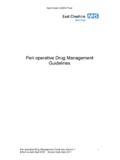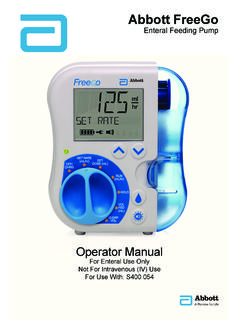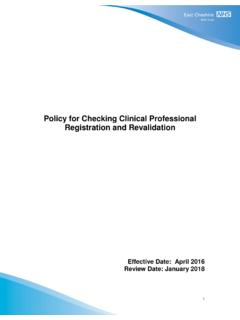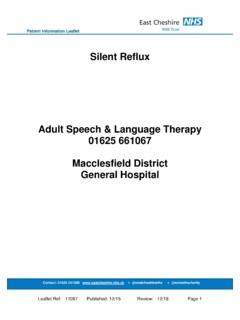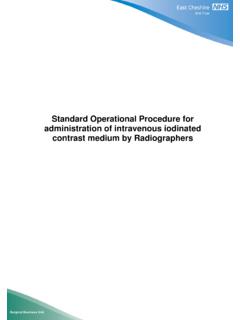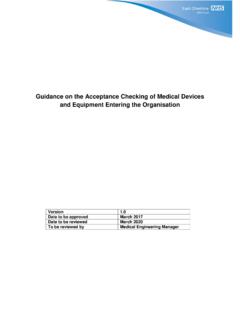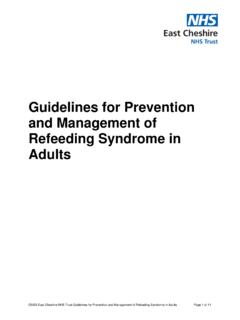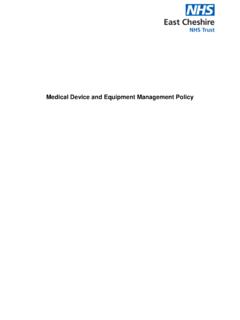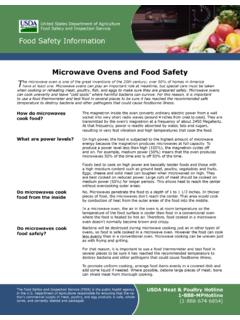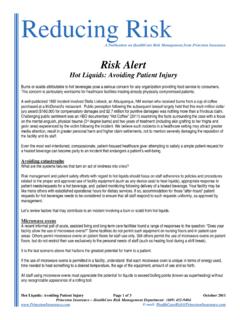Transcription of INFECTION PREVENTION & CONTROL FOOD HYGIENE …
1 INFECTION PREVENTION & CONTROL food HYGIENE guidelines Initiated by : INFECTION PREVENTION & CONTROL Team & Hotel Services Approved by: INFECTION PREVENTION & CONTROL Committee Issue Date: 2009 Review Date: 20011 Version: 3 Doc Ref: food HYGIENE guidelines 2009 v 3 2 of 18 East Cheshire NHS Trust Policy Title: food HYGIENE guidelines Executive Summary: Details the precautions required within the Trust for handling, storage and distribution of food . Details of food that is permitted to be brought into the trust and under what conditions and circumstances. Supersedes: V2 2007 Description of Amendment(s): Minor Wording This policy will impact on: Employees and health & safety Financial Implications: None Policy Area: INFECTION CONTROL Trust Wide Document Reference: Version Number: 3 Effective Date: 2009 Issued By: Director of INFECTION PREVENTION and CONTROL Review Date: Author: Service Manager INFECTION PREVENTION and CONTROL Impact Assessment Date: APPROVAL RECORD Committees / Group Date Consultation: INFECTION CONTROL Committee Health Protection Unit Approved by Director: Director of Nursing & Patient Care Standards Received for information: food HYGIENE guidelines 2009 v 3 3 of 18 East Cheshire NHS Trust CONTENTS Page 1.
2 Introduction 4 2. Personal HYGIENE 4 3. General Ward Kitchen 5 Ward Kitchen HYGIENE 5 4. Visitors 6 5. Notices 6 6. Ward Kitchen Fridges 6 7. Patients Meals 7 8. Rehabilitation Kitchens 7 9. guidelines for Patient Catering Organised by Ward Staff 8 Hot food 8 Cold food 8 Commercially Prepared food 8 Home Made Dishes/Sandwiches 9 Kosher Meals 9 10. guidelines for Staff catering for Functions/Entertainment 9 Individual Staff/Ward/Dept/Office Parties Catered for by Individual Contributions of food 9 Individual Members of Staff Organising food for a Function for Other Staff, either self prepared or using an Outside Caterer 9 Legislation, guidelines and References 10 Appendices I 10 Point Code for food Handlers II The Use of Microwave Ovens in Hospital III Ice Making Machines IV Labelling Instructions V Fridge Temperature Record VI HACCP food HYGIENE guidelines 2009 v 3 4 of 18 East Cheshire NHS Trust 1.
3 INTRODUCTION All staff involved in the storage, preparation, transportation and serving of food need training in food HYGIENE practices to minimise the transmission of gastro-intestinal infections to patients, the general public, and staff of the East Cheshire NHS Trust. Patients in hospital are particularly vulnerable to the effects of food poisoning. Recent guidelines which are recommendations from the Department of Health have been taken into consideration when drawing up the procedures, policies and checklists for main hospital kitchens and ward kitchens ( food HYGIENE Regulations (General) 1995, food Act 1984, food Safety Act 1990, The food Safety (Temperature Controls) Regulations 1995). EC 852/853 food HYGIENE (England) Regulations 2006. food is at risk in all areas where it is stored, prepared, transported and served. Good food HYGIENE conditions are necessary; i.
4 To prevent the risk of food poisoning. ii. To assure the public that food is free from spoilage and is prepared and served in clean surroundings by properly trained staff. iii. To ensure that the food is palatable and nutritious as well as safe. Most outbreaks of food poisoning are caused by bacteria that are given ideal conditions to grow. The ideal conditions are: - Time - Temperature - food - Moisture The risk of an outbreak of food poisoning occurring will be minimised if all staff involved in food handling follow the correct procedures and policies. All staff are responsible for their own good standards of practice and must be aware of the role they have in ensuring that food is safe. Any breaches in the regulations for kitchen HYGIENE could lead to possible prosecution. These guidelines are intended for ward staff, nursing, domestic and other staff using ward kitchens.
5 2. PERSONAL HYGIENE All staff MUST: i. Report any symptoms of ill health eg. rashes, diarrhoea, vomiting, upper respiratory tract and septic infections to their Managers, with details to the Occupational Health Department for guidance. ii. Cover all wounds with a coloured waterproof dressing whilst on duty. iii. Keep jewellery to the minimum of a plain wedding or signet ring. Finger nails should be kept short and clean. Nail varnish or acrylic/false nails are not acceptable. iv. Long and shoulder length hair needs to be tied back off the face. v. Receive training in a good hand cleansing technique (see Good Practices Policy). Hands must always be washed before commencing work in ward kitchens and before serving food and drinks. food HYGIENE guidelines 2009 v 3 5 of 18 East Cheshire NHS Trust vi. Be clean and wear clean green plastic aprons when serving food .
6 Vii. Not smoke or consume food and drink in ward kitchens. There are designated areas for staff breaks. The Trust operates a no smoking policy. viii. Not cough or sneeze over food . ix. Not sit on work surfaces. 3. GENERAL WARD KITCHEN Ward kitchens are to be used by authorised staff only. Patients and visitors MUST NOT use these kitchens for either the preparation of food or drink. General Ward Kitchen HYGIENE i. Keep hands off food as far as possible. All staff must use clean serving utensils. ii. Ensure that any spillage of food is cleaned up immediately with a green disposable cloth. iii. Ensure that all food is placed immediately in the fridge on arrival in the ward, if it is to be used later. iv. Ensure that all food is covered, labelled and stored correctly. v. Ensure that food is used within the 'Use by' dates and used in strict rotation.
7 Do not overstock. vi. Personal belongings must not be stored in kitchens. vii. Use foot pedal when opening bins and avoid touching the lid. viii. Keep plants and pets out of kitchens. ix. Ensure that all work surfaces/window sills are free from clutter. x. Do not line drawers or shelves with paper. xi. Do not wash hands at the kitchen sink. Only use the wash hand basins. Do not use wash hand basin for any other purpose than washing hands. xii. Only use a disposable nail brush if absolutely necessary. A clean brush must be used on one occasion and then immediately disposed of. xiii. Report any signs of pest infestations immediately to the Hotel Services Monitoring Department ext. 3816. xiv. Ensure dishwashers reach the required wash temperature of 60 C and rinse cycle temperature of 80-82 C. Any hand washing of pots must be done in very hot soapy water (green gloves must be worn) rinsed and thoroughly dried on disposable paper roll.
8 COTTON TEA TOWELS MUST NOT BE USED (except in rehabilitation situations - see Rehabilitation Kitchens). 4. VISITORS Visitors must not be allowed entry into ward kitchens or the use of any facilities. Visitors should check with the ward sister to see if the patient is permitted food and must only bring in food that is permitted in the leaflet ICL 48 guidelines for visitors wishing to bring food into hospital for patients . 5. NOTICES All kitchens must display the following notices: - 10 Point Code for food Handlers (Appendix I) - No Smoking - Now Wash your Hands - Use of Microwave Ovens in Hospital (if applicable) (Appendix II) - Use of Ice Making Machines (if applicable) (Appendix III) - Fridge notice indicating correct use (to be sited on the fridge door) (Appendix IV) - Fridge temperature recording chart (to be sited on or near fridge) (Appendix V) food HYGIENE guidelines 2009 v 3 6 of 18 East Cheshire NHS Trust 6.
9 WARD KITCHEN FRIDGES i. All fridges must have a thermometer inside, which must be checked by the domestic and recorded twice daily and be within 1-5 C. Fridge temperature chart recordings of temperature to be logged twice a day. If the temperature is not within these limits, report immediately to Estate Services, ext. 1616. Units producing own meals cluster houses, rehabilitation - fridge temperatures to be taken and recorded three times per day. ii. Fridges must be regularly defrosted kept clean, and any spillage cleaned up immediately. iii. Jugs of milk stored in the fridge must have a lid and label. Pergola chilled unit to keep boxed mild cold. Temperatures to be recorded twice daily and be within 1-5oc. Temperature fluctuations must be reported to Estates Services. The unit must be washed daily and the nozzles thoroughly cleaned.
10 Iv. Any food kept over from the previous day must be discarded each morning. (Inform the Nurse-in-Charge first). v. Staff food must only be stored in fridges if it is contained in a sealed, clean container and labelled with a name and date. Patient s food brought in from home should be similarly contained, see leaflet ICL 48 guidelines for visitors wishing to bring food into hospital for patients . vi. Fridges must not be overfilled with food . Air circulation within is most important to maintain the correct temperature. vii. Any damage to seals which prevent the fridge door from closing properly must be reported immediately to Estate Services, ext. 1616. viii. No clinical items or medicines must be stored in kitchen fridges. 7. PATIENTS MEALS i. The service of all meals must be a continuous process carried out by an adequate number of staff.
